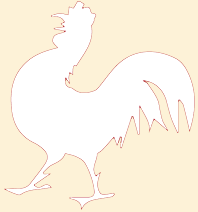Tramin - Termeno
Geologic route "Höllental"
The trail begins just opposite the Hotel Winzerhof, leads over the gravel road and runs alongside the Höllental River. Rows of grape vines line the trail immediately to the right. Shortly, we arrive in front of the enormous limestone boulder with the shrine of St. Nepomuk. This rock was brought here by a particularly violent mudslide, a constant reminder of the elemental force of nature. The next information board illustrates the mudslide of 1986, and refers visitors to the Hoamet Tramin Museum for more information on this event. A panoramic view illustrates the layers of rock from Montan to the Weisshorn and the Schwarzhorn. Once again, we pass by a beautiful stone: A Voltago conglomerate, also left here by a mudslide, and created 245 million years ago. A peaceful spot with 5 pillars and a semi-circular bench, packed with descriptions of the types of stone in the area, is a wonderful place to stop off for a break. At the dam wall, a blackboard details the layer sequence of the mighty outcrop opposite us. The final panel illustrates the variety of fossils hidden in the layers; if you’re lucky, you might also find some in the river bed.
Walking time: approx. 30 minutes
The trail can be extended if you follow the no.10 signposts to the Gummererhof farm, then turn left onto trail no. 4 to the Zogglerwiese meadows and return via Söll and along the nature trail to Tramin.
Along the geological path you will find a lot of signs and stations that shows the geology and the connected relations. The main attraction of the trail is the "Höllenbach" catastrophe of 1986. Following the path you will arrive on a big rock of tufa and the S. Nepomuk santuary. This rock last a violent mudslud and reminds the power of nature. The next sign reminds the mudslide of 1986. Just a short look to the panorama shows the different layers of rock from Montan to Weis and Schwarzhorn. Nearby you will find another rock. That's a Voltago conglomerate who resisted a mudslide 245 millions of years ago. After it there's the possibility to take a little break on a quiet island with 5 columns and a little bench with some small different rockets from the sourroundings. On the dam of the river a sign will explane you the different layers of the rock infront of you. The last sign indicate some fossils which where found in the river bed and with a bit of luck also you could find one.


